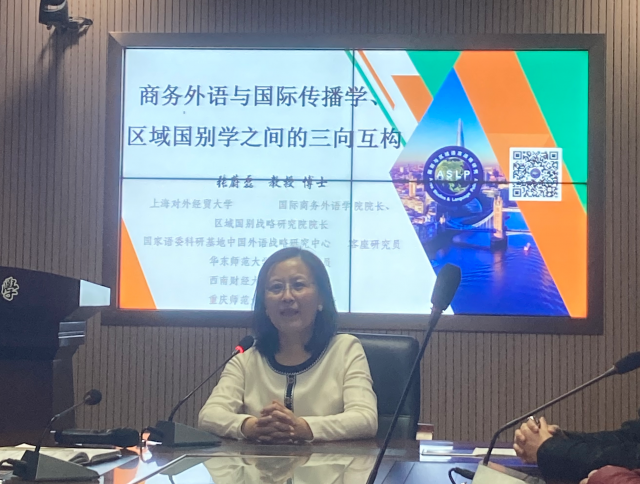On the afternoon of November 22, 2024, teachers and students from SFL attended a lecture titled the Triangular Interconstruction of Business Foreign Languages, International Communication Studies, and Area Studies. The lecture was delivered by Professor Zhang Weilei, Dean of the School of Languages and Director of the Institute of Regional and International Studies at Shanghai University of International Business and Economics. The lecture was presided over by Deputy Dean Du Jingping, with teachers and postgraduate students of SFL attending. The lecture was organized around three dimensions: Regional and Area Studies, International Communication, and Business Foreign Languages. It explored the triangular interconstruction between the three fields, with a focus on sharing insights into the construction of the business foreign languages discipline and talent development in the new era.

Professor Zhang first introduced the historical background of the emergence of Area Studies as a discipline. She pointed out that China is now entering a new historical stage, progressing from “engaging with the world” to “approaching the world” and further to “leading the world”. Against this backdrop, the emergence and development of the Area Studies discipline respond to the country’s requirements for enhancing communication capacity, discourse power, content dissemination, and communication methods. Professor Zhang then explained the concept of international communication, highlighting its characteristics, key communicators, target audiences, objectives, as well as the challenges and possible pathways for its advancement. Professor Zhang further elaborated on why Area Studies is a natural and essential choice for foreign language disciplines and business foreign language studies. Professor Zhang then discussed the interconnected relationship among the three fields. She noted that, in the context of national strategic needs, foreign language disciplines must undergo transformative development, with Area Studies helping to expand their academic boundaries. Moreover, both Area Studies and foreign language disciplines serve as the foundation for international communication. Foreign language disciplines should shift from instrumental languages to knowledge-based languages. Finally, Professor Zhang discussed the cultivation of foreign language talent in the context of the “broad foreign languages” and “large-scale external communication”. She emphasized that the development of the business foreign language discipline should focus on four vertical levels: national, regional, enterprise, and school levels, as well as four horizontal levels: discipline, specialty, curriculum, and talent cultivation. She also shared how to scientifically plan the discipline group of business foreign languages and conduct interdisciplinary research in the context of the new liberal arts. Professor Zhang pointed out that “boundaries are being reshaped, and spaces are being reorganized,” emphasizing that the two key growth areas for foreign language disciplines are Area Studies and artificial intelligence. By focusing on these two growth points, the development of the discipline can be further enhanced. Professor Zhang also told us that disciplines should not become boundaries for cognitive development and our research should be driven by problems, promoting interdisciplinary collaboration, integration, and innovation. At the lecture's conclusion, Deputy Dean Du summarized the main points, and the attendees engaged in spirited discussions with Professor Zhang. Teachers and students expressed that they had gained invaluable insights from the lecture, which prompted them to think about how to seize the two current growth opportunities to promote both personal and academic development. By Guo Yuxin and Du Jingping
|